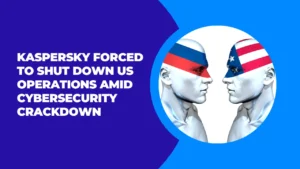Physical Address
304 North Cardinal St.
Dorchester Center, MA 02124
Physical Address
304 North Cardinal St.
Dorchester Center, MA 02124

In a stunning turn of events, Russian antivirus powerhouse Kaspersky Labs has announced the imminent closure of its US operations, marking the end of a two-decade presence in the American market. This drastic move comes in the wake of a sweeping ban imposed by the Biden administration, citing grave national security concerns.
Kaspersky Labs, once a titan in the US cybersecurity landscape, is now packing its bags. The company’s decision to wind down its American operations stems from what it calls a “sad and difficult” realization that “business opportunities in the country are no longer viable.”
| Aspect | Details |
|---|---|
| Company | Kaspersky Labs |
| Action | Closing US operations |
| Effective Date | July 20, 2024 |
| Reason | US government ban due to security concerns |
| Update Cutoff | September 29, 2024 |
| Global Users | 400+ million |
| Corporate Clients | 270,000 |
| Countries Served | 200+ |
“Starting from July 20, 2024, Kaspersky will gradually wind down its US operations and eliminate US-based positions,” the firm stated in a somber announcement.
The US Commerce Department’s decision to ban Kaspersky’s products wasn’t made lightly. Commerce Secretary Gina Raimondo emphasized the potential risks associated with the company’s ties to Moscow:
“Russia has shown it has the capacity and… intent to collect and weaponize the personal information of Americans.”
Despite the US setback, Kaspersky remains a global cybersecurity player:
| Metric | Number/Description |
|---|---|
| Countries with offices | 31 |
| Total users | 400+ million |
| Corporate clients | 270,000 |
| Countries served | 200+ |
The ban’s ripple effects will be felt across the US cybersecurity landscape:
This isn’t the first time Kaspersky has faced scrutiny in the US. In 2017, the Department of Homeland Security banned Kaspersky products from federal networks. The current ban, however, takes things a step further.
Kaspersky isn’t taking this lying down. The company has:
“Kaspersky has been operating in the US for close to 20 years, contributing to the nation’s strategic cybersecurity goals by safeguarding organizations and individuals in the country from ever-evolving cyberthreats.”
As Kaspersky exits stage left, questions arise about the future of cybersecurity in the US:
The Kaspersky saga offers valuable lessons for tech companies operating in an increasingly complex geopolitical landscape:
While Kaspersky’s US chapter is closing, the company isn’t disappearing entirely:
The exit of Kaspersky from the US market marks the end of an era and the beginning of a new chapter in cybersecurity. As the dust settles, both companies and consumers will need to adapt to a changed landscape, one where geopolitics and national security concerns play an increasingly central role in shaping the tech industry.
For US businesses and individuals, the message is clear: it’s time to reevaluate your cybersecurity strategy and ensure you’re protected in this new reality. The race is on to find reliable, trustworthy alternatives that can fill the Kaspersky-shaped hole in the market.
As we move forward, one thing is certain: the intersection of technology, security, and international relations will continue to be a hot-button issue, shaping the future of our digital world in ways we’re only beginning to understand.